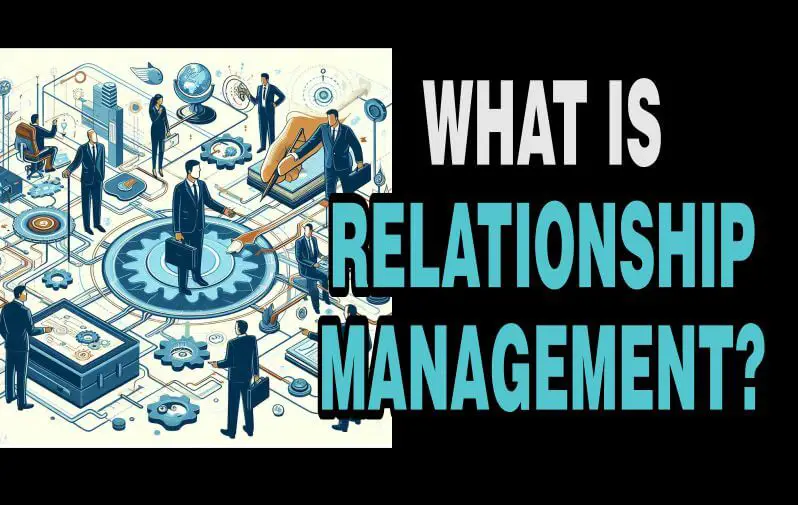Last updated on January 28th, 2025 at 06:48 am
What is relationship management? A term used mostly in the business world demonstrating nurturing and maintaining connections with individuals or entities.
Whether in personal or professional spheres, it involves building trust, understanding needs, and promoting mutual respect for quality relationships.
Effective relationship management is crucial for successful collaborations, customer satisfaction, and personal growth.
It covers communication, empathy, and problem-solving skills to ensure positive and enduring interactions.
It is a concept that applies to all types of relationships, whether personal, professional, or societal.
In this article, we will unknot the entire concept of relationship management, exploring its definition, importance, key elements, and types in various contexts.
Related: Relationship Management in Emotional Intelligence
Table of Contents
- What is Relationship Management?
- The Importance of Relationship Management
- What is Relationship Management Skills?
- Applications and Examples of Relationship Management
- Frequently Asked Questions
- Final Thoughts
What is Relationship Management?

Relationship Management Definition
Relationship management is the strategies and practices implemented by individuals or organizations to effectively manage and maintain relationships with their clients, customers, or stakeholders.
It involves establishing and nurturing strong connections, understanding their needs and preferences, and proactively addressing any concerns or issues.
Relationship management aims to build trust, loyalty, and satisfaction among all parties involved, ultimately leading to long-term and mutually beneficial relationships.
It may involve activities such as regular communication, providing personalized experiences, delivering exceptional customer service, and constantly seeking feedback to improve the overall relationship and maximize positive outcomes.
Related: Relationship Management in Banking
The Importance of Relationship Management

Effective relationship management is essential for the success and growth of individuals, businesses, and society as a whole.
Strong relationships based on trust, respect, and understanding enhance collaboration, loyalty, and goodwill.
Effective relationship management is crucial for several reasons as expressed below:
1. Customer Satisfaction: Building strong relationships with customers leads to higher levels of customer satisfaction as it makes customers remain loyal to the company.
2. Customer Retention: Maintaining existing customers is more cost-effective than acquiring new ones. By focusing on relationship management, organizations can reduce customer churn and increase customer retention rates.
3. Reputation Management: Organizations with strong relationships with employees, community or shareholders are more likely to receive support, attract top talent, and avoid negative publicity.
4. Business Growth: Strong relationships often lead to opportunities for business growth. Satisfied customers are likely to refer others to the organization, while business partners and suppliers may collaborate on new projects or ventures.
5. Conflict Resolution: Effective relationship management can help constructively resolve conflicts and disputes.
7. Collaboration and Partnership: Relationship management facilitates collaboration and partnership opportunities.
Related: Introduction Partner Relationship Management
What is Relationship Management Skills?

Relationship management skills are the attitudes and actions that build and maintain positive and productive relationships with others.
These skills are essential for effective communication, collaboration, and teamwork in both personal and professional settings.
There are several keys to relationship management as we can see below:
1. Understanding Needs: The foundation of relationship management lies in understanding the needs, expectations, and aspirations of all parties involved. This requires active listening, empathy, and a genuine desire to help.
2. Communication: Effective communication is crucial for relationship management. It involves not only conveying information but also actively engaging in two-way dialogue, sharing ideas, resolving conflicts, and demonstrating genuine interest in the other party’s perspective.
3. Trust-building: Trust is the bedrock of any successful relationship. Building trust involves being reliable, transparent, and consistent in actions and words, while also being willing to trust the other party. Trust is earned over time but can be easily shattered if not nurtured.
Related: Understanding the Business Relationship Manager
4. Collaboration: Collaboration is about working together towards a common goal. It involves sharing resources, knowledge, and expertise, as well as seeking win-win solutions.
5. Conflict Resolution: Conflicts are inevitable in any relationship, as individuals have different opinions, priorities, and interests. Successful relationship management requires the ability to address conflicts constructively, seeking solutions that satisfy both parties’ needs and preserve the relationship.
6. Empathy: It is important to understand and consider the feelings, perspectives, and needs of others. Empathy helps in establishing rapport, showing support, and resolving conflicts with sensitivity.
7. Networking: Building and maintaining a network of professional relationships is important for career growth and opportunities. Networking skills include initiating and maintaining connections, showing genuine interest in others, and providing support when needed.
8. Emotional Intelligence: Having emotional intelligence involves understanding and managing your own emotions as well as recognizing and responding to the emotions of others. This skill helps in developing positive relationships, managing conflicts, and making sound decisions.
Related: Who are Relationship Managers?
Applications and Examples of Relationship Management
Relationship management can be applied in every area of life and in different scenarios.

Let’s take a look:
1. Customer Relationship Management
In the business world, relationship management is often associated with customer relationship management (CRM).
CRM involves strategies and technologies aimed at building and maintaining long-term relationships with customers, enhancing customer satisfaction, and driving business growth.
2. Employee Relationship Management
Relationship management is equally important within organizations.
Effective employee relationship management promotes a positive work environment, encourages employee engagement and productivity, and reduces turnover.
It involves open communication, regular feedback, recognition, and growth opportunities.
3. Supplier Relationship Management
Suppliers play a critical role in the success of any business.
Managing supplier relationships ensures on-time delivery, competitive pricing, and continuous improvement.
Developing partnerships with key suppliers enables organizations to collaborate on innovations, optimize supply chain operations, and create mutual value.
4. Community Relationship Management
Businesses have a responsibility to engage with and contribute to the communities in which they operate.
Community relationship management involves building positive relationships with local stakeholders, including government bodies, non-profit organizations, and residents.
5. Relationship Management in Emotional Intelligence
Relationship management in emotional intelligence refers to the ability to effectively manage and nurture relationships with others.
It involves being aware of and managing your emotions, as well as understanding and responding to the emotions of others to build and maintain positive relationships.
Related: What is Client Relationship Management?

6. Relationship Management in Personal Life
While relationship management is often associated with professional settings, its principles are equally relevant in personal life.
Building strong relationships with family, friends, and neighbors requires effective communication, trust, and collaboration.
These skills enable individuals to navigate conflicts, develop empathy, and create a support network that enhances overall well-being.
7. Relationship Management in Banking
Relationship management in banking is the strategies and techniques used by banks to develop and maintain strong relationships with their customers.
It involves understanding and meeting the needs and expectations of customers on a personalized level.
Relationship managers in banks play a crucial role in building rapport and trust with customers by proactively addressing their concerns, providing personalized solutions, and ensuring smooth and efficient transactions.
8. Relationship Management in Business
Relationship management in business refers to the strategies and practices used to cultivate and maintain positive relationships with customers, suppliers, partners, and employees.
It involves effective communication, providing exceptional customer service, managing conflicts, and building trust and loyalty.
By prioritizing relationship management, businesses can enhance customer satisfaction, increase sales, and improve overall business performance.
9. Partner Relationship Management
Partner Relationship Management (PRM) refers to the strategic approach used by businesses to manage and enhance relationships with their channel partners.
It involves the implementation of software tools and processes to streamline communication, collaboration, and coordination between a company and its partners, ultimately aiming to improve efficiency, sales, and overall partner satisfaction.
10. Vendor Relationship Management
Organizations need to maintain good relationships with their vendors to ensure the smooth supply of goods and services.
Effective vendor relationship management involves regular communication, negotiation, and resolving any conflicts or issues that may arise.
11. Investor Relationship Management
Maintaining ongoing relationships with investors is crucial for businesses seeking funding or managing shareholders.
Investor relationship management includes regular communication, providing transparent information and financial updates, and addressing concerns or inquiries related to investments.
12. Social Relationship Management
In the digital age, managing relationships on social media platforms has become important for individuals and organizations.
Social relationship management involves engaging with followers, responding to comments or messages promptly, and using social media to build positive brand perceptions.
Frequently Asked Questions
What do you mean by relationship management?
Relationship management involves building and maintaining positive connections with others, whether in personal or professional settings, to achieve mutual understanding and cooperation.
What are the examples of relationship management?
Examples of relationship management include maintaining good rapport with clients, resolving conflicts within a team, and fostering strong partnerships with suppliers.
What is relationship management in emotional intelligence?
In emotional intelligence, relationship management refers to the ability to navigate social interactions effectively, empathize with others, and build and maintain meaningful relationships.
Why is a relationship manager important?
A relationship manager is important because they serve as a bridge between an organization and its clients, ensuring client satisfaction, retention, and long-term success through effective communication and problem-solving.
Final Thoughts
Relationship management is a crucial skill that underpins successful interpersonal interactions in various contexts.
By understanding and meeting the needs of others, communicating effectively, cultivating trust, and promoting collaboration, individuals and organizations can develop strong, lasting relationships.
Whether in business or personal life, relationship management is an essential tool for creating positive and mutually beneficial connections.
REFERENCES
- Relationship Management: Definition and Guide
- Relationship Management: Definition, Types, and Importance
- Relationship Management: The Fourth Pillar Of Emotional Intelligence
- Top Relationship Management Skills That Enhance Your Business
- Relationship Management: The Key To Achieving It All – Forbes
Pyo Merez (PsyD) is a distinguished adolescent and adult psychologist at the forefront of mental health advocacy.
With expertise in cognitive and developmental psychology, focusing on social relationships, cultural contexts, and individual differences, Pyo has dedicated his career to empowering adolescents and adults.
As a sought-after speaker and panelist, Pyo shares invaluable insights on issues affecting young people, contributing to a deeper understanding of mental health and well-being in today's society.


